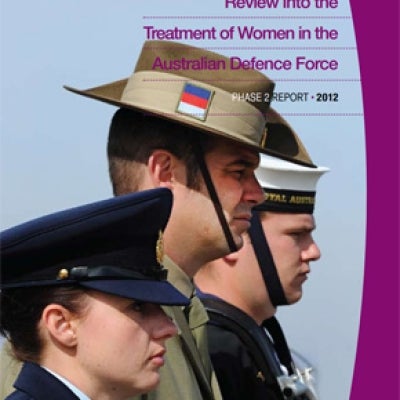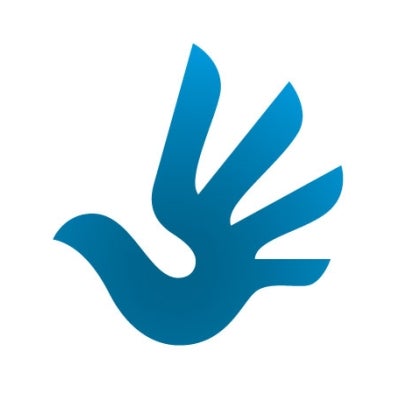Refine results
-
29 January 2013Book page
1. ADFA: Description of Current Culture
The Terms of Reference required the Review to make recommendations on initiatives to drive cultural change at ADFA regarding the treatment of women. To properly identify these initiatives, the Review needed to assess the culture as it currently exists. Part of this process involved examining the notion of military culture generally and, more specifically, the culture for women at ADFA. The… -
29 January 2013Book page
Commissioner’s Message
I am pleased to present the Report of the cultural review into the Treatment of Women at the Australian Defence Force Academy (ADFA). This report concludes Phase One of the Review. Phase Two of the Review will examine the treatment of women across the broader Australian Defence Force (ADF). I wish to thank my fellow Review Panellists – Sam Mostyn, Mark Ney and Damian Powell – for their wise… -
29 January 2013Book page
Terms of Reference
The Terms of Reference were developed by the Australian Human Rights Commission after consultation with the ADF. The Terms of Reference requested the Review Panel, led by the Sex Discrimination Commissioner, to review, report and make recommendations on: the treatment of women at the Australian Defence Force Academy with a particular focus on the adequacy and appropriateness of measures to … -
29 January 2013Book page
Transmittal Letter
21 October 2011The Hon Robert McClelland MPAttorney-GeneralCentral Office3-5 National Circuit BARTON ACT 2600 Dear Attorney, Review into the Treatment of Women in the Australian Defence Force – Phase 1 I am pleased to present to you the Commission’s report of the Review into the Treatment of Women at the Australian Defence Force Academy. This Report represents the first stage of a broader… -
29 January 2013Webpage
Report on the Review into the Treatment of Women in the Australian Defence Force Academy
Phase 1 of the Review into the Treatment of Women in the Australian Defence Force Downloads Download PDF Download Word -
28 January 2013Webpage
2012 Human Rights Medal and Awards Winners
Human Rights Medal 2012 winner Ian Thorpe OAM Human Rights Medal Ian Thorpe OAM His exploits in the pool have made him a household name, but what is less known is that Ian Thorpe has spent more than a decade as a passionate advocate for Indigenous people and young Australians. His Fountain for Youth charity is working with twenty remote communities across the country. Thorpe has taken a… -
Sex Discrimination28 January 2013Webpage

Report on the Review into the Treatment of Women in the Australian Defence Force
Phase 2 of the Review into the Treatment of Women in the Australian Defence Force Community Guide Download PDF (1.2 mb) Download Word (1.1 mb) Download Complete Report Download PDF (8.0 mb) Download Word (17.4 mb - note: does not include Appendices) Download Appendices Word (5.9 mb) Contents Overview and Recommendations [ Word / PDF] Chapter 1: The Case for Change – Why the ADF Should Care… -
Sex Discrimination28 January 2013Webpage
About
The Commission was engaged by the Australian Defence Force in a collaborative relationship to improve the representation of women in male-dominated environments -
Asylum Seekers and Refugees23 January 2013Publication
Immigration detention on Christmas Island - Observations from visit to Immigration detention facilities on Christmas Island
Immigration detention on Christmas Island Observations from visit to Immigration detention facilities on Christmas Island -
Education17 January 2013Webpage
We all have a right to feel safe and respected
Violence, harassment and bullying are human rights issues that profoundly affect the lives of many people in Australia. We all have a right to feel safe and respected. We all have a right to live our lives free from violence. Violence, harassment and bullying can violate these rights. They can also impact on other rights, such as the right to education and the right to health. Violence,… -
Commission – General24 December 2012Webpage
Get Involved
Discover how the Commission wants all Australians to get involved in human rights. You can learn more by signing up for our email list. -
Commission – General20 December 2012Webpage
Welcome to the Human Rights Awards
-
14 December 2012Book page
Annual Report 2002-2003: organisation chart
Human Rights and Equal Opportunity Commission: Annual Report 2002 - 2003 Back to contents Organsational Chart -
14 December 2012Book page
Annual Report 2001-2002: Orgchart 2
Click here to return to the Organisation Chart Page Click here to return to the Annual Report Index Page -
Rights and Freedoms14 December 2012Project

Human Rights Briefs (1999 - 2001)
The Human Rights Brief provides legal practitioners, community advocates and others with guidance on the content and scope of human rights and fundamental freedoms in Australia and their use in Australian law. Each number will cover a specific topic. -
14 December 2012Book page
Close the Gap - National Indigenous Health Equality Targets
On 20 December 2007, the Council of Australian Governments (COAG) agreed to a partnership between all levels of government to work with Indigenous1 communities to achieve the target of ‘closing the gap’ on Indigenous disadvantage; and notably, to close the 17-year gap in life expectancy within a generation, and to halve the mortality rate of Indigenous children within ten-years. -
14 December 2012Book page
Close the Gap - Part 1 Background
In my 2005 Social Justice Report1, I argued that it was unacceptable for a country as rich as ours, and one based on the notion of the ‘fair go’ and the ‘level playing field’, to tolerate the gross health inequality that has existed between Indigenous and non-Indigenous Australians for at long as records have been kept. I called for action, and I made recommendations that set out a broad path to… -
14 December 2012Book page
Close the Gap - Part 1 Background
That the governments of Australia commit to achieving equality of health status and life expectation between Aboriginal and Torres Strait Islander and non-Indigenous people within 25 years. -
14 December 2012Book page
Close the Gap - Part 1 Background
We, the undersigned, are deeply concerned that Aboriginal and Torres Strait Islander peoples have not shared in the health gains enjoyed by other Australians in the last 100 years. It is a national scandal that Indigenous Australians live 17 years less than other Australians. Indigenous Australians continue to needlessly suffer and die early, not from a lack of solutions or government commitments… -
14 December 2012Book page
Close the Gap - Part 1 Background
‘Governments can make a real difference in the lives of indigenous people by addressing social and economic disadvantage, including life expectancy, and improving governance and service delivery arrangements with indigenous people.
